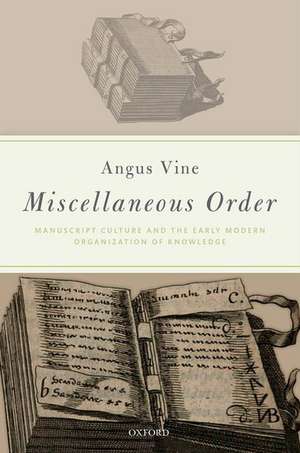Miscellaneous Order: Manuscript Culture and the Early Modern Organization of Knowledge
Autor Angus Vineen Limba Engleză Hardback – 24 ian 2019
Preț: 559.07 lei
Preț vechi: 740.78 lei
-25% Nou
Puncte Express: 839
Preț estimativ în valută:
106.98€ • 111.98$ • 89.04£
106.98€ • 111.98$ • 89.04£
Carte tipărită la comandă
Livrare economică 19-25 martie
Preluare comenzi: 021 569.72.76
Specificații
ISBN-13: 9780198809708
ISBN-10: 0198809700
Pagini: 302
Ilustrații: 22 halftones
Dimensiuni: 164 x 241 x 24 mm
Greutate: 0.61 kg
Editura: OUP OXFORD
Colecția OUP Oxford
Locul publicării:Oxford, United Kingdom
ISBN-10: 0198809700
Pagini: 302
Ilustrații: 22 halftones
Dimensiuni: 164 x 241 x 24 mm
Greutate: 0.61 kg
Editura: OUP OXFORD
Colecția OUP Oxford
Locul publicării:Oxford, United Kingdom
Recenzii
This is a richly researched, elegantly written and important book that everyone interested in early modern manuscript construction, textual composition, information management and knowledge discovery will want to read.
Miscellaneous Order is an important book that achieves its ambition, which is to help us to understand the habits of collecting and organizing material from diverse sources in early modern England. It persuaded me that miscellany-making lies at the heart of early modern intellectual culture. This book offers a big-picture view of the history of the early modern miscellany.
[a] remarkable contribution to recent scholarship ... Vine's formalist approach to the analysis of his source materials offers an innovative contribution to the field because of its resistance to an exclusive interest in particular subjects, personalities, or contents that have defined other major contributions to the fields of textual scholarship, critical bibliography, and manuscript studies in recent years. Vine argues effectively that the early modern material forms and practices embedded in manuscript miscellanies reflect how early modern community developed in the 'broader intellectual context of manuscript culture'
Miscellaneous Order can be used as a reference on particular topics, but because Vine weaves important themes through each of the book's chapters, it rewards linear reading. Of obvious interest to manuscript scholars and book historians, the book also has much to offer intellectual historians, historians of science, and literary critics, making its potential audience as heterogeneous as the books it describes. In short, Miscellaneous Order is an important contribution to our understanding of early modern manuscript miscellanies as complex, diverse, occasionally puzzling, and invariably rich documents.
Miscellaneous Order balances the theoretical and the practical most admirably. This really is an exceptionally good book: a delight to read and full of information and insight.
Having read Vine's book...historians might no longer put an odd volume aside, take note of this as a "miscellaneous" item, and move on. Instead, some might seek to understand what these texts tell us about the rich and diverse figures that once produced them.
It is a valuable study for scholars interested in better understanding miscellanies and early modern manuscript culture more generally.
Miscellaneous Order is an important book that achieves its ambition, which is to help us to understand the habits of collecting and organizing material from diverse sources in early modern England. It persuaded me that miscellany-making lies at the heart of early modern intellectual culture. This book offers a big-picture view of the history of the early modern miscellany.
[a] remarkable contribution to recent scholarship ... Vine's formalist approach to the analysis of his source materials offers an innovative contribution to the field because of its resistance to an exclusive interest in particular subjects, personalities, or contents that have defined other major contributions to the fields of textual scholarship, critical bibliography, and manuscript studies in recent years. Vine argues effectively that the early modern material forms and practices embedded in manuscript miscellanies reflect how early modern community developed in the 'broader intellectual context of manuscript culture'
Miscellaneous Order can be used as a reference on particular topics, but because Vine weaves important themes through each of the book's chapters, it rewards linear reading. Of obvious interest to manuscript scholars and book historians, the book also has much to offer intellectual historians, historians of science, and literary critics, making its potential audience as heterogeneous as the books it describes. In short, Miscellaneous Order is an important contribution to our understanding of early modern manuscript miscellanies as complex, diverse, occasionally puzzling, and invariably rich documents.
Miscellaneous Order balances the theoretical and the practical most admirably. This really is an exceptionally good book: a delight to read and full of information and insight.
Having read Vine's book...historians might no longer put an odd volume aside, take note of this as a "miscellaneous" item, and move on. Instead, some might seek to understand what these texts tell us about the rich and diverse figures that once produced them.
It is a valuable study for scholars interested in better understanding miscellanies and early modern manuscript culture more generally.
Notă biografică
Angus Vine is Lecturer in Early Modern Literature at the University of Stirling. His research focuses on the literary and intellectual history of sixteenth- and seventeenth-century England. His interests include manuscript culture, book history, textual scholarship, epistemology, antiquarianism, and editing. He is the author of In Defiance of Time: Antiquarian Writing in Early Modern England (2010, with Abigail Shinn), The Copious Text: Encyclopaedic Books in Early Modern England (2014), and (with Katie Halsey) Shakespeare and Authority: Citations, Conceptions, and Constructions (2018). He is currently editing Volume 3 of The Oxford Francis Bacon (with Richard Serjeantson) and Volume 4 of The Oxford Traherne (with Ann Moss).
